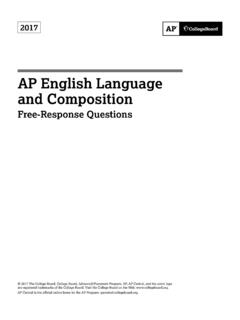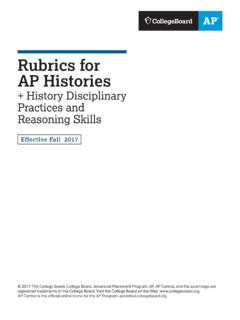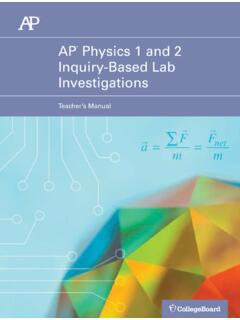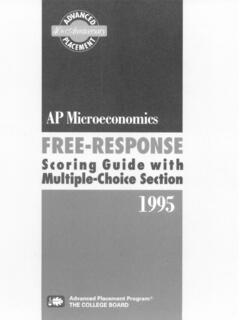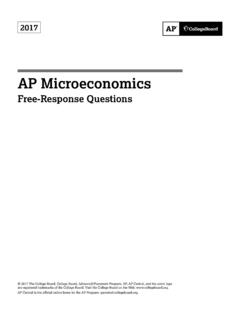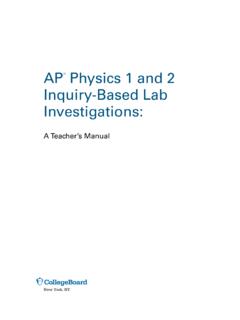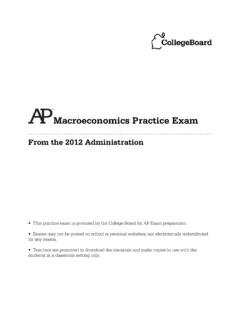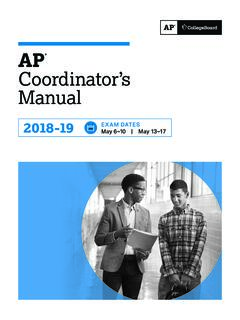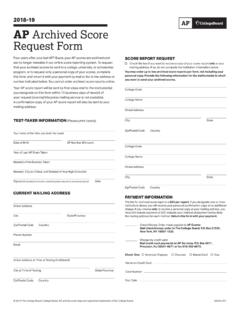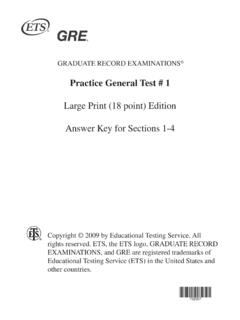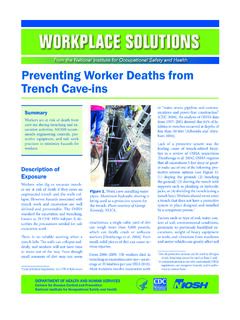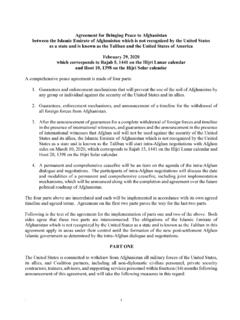Transcription of Sample Student Responses - Packet 2 - AP Central
1 2020AP English language and Composition 2020 College Board. College Board, Advanced Placement, AP, AP Central , and the acorn logo are registered trademarks of College Board. Visit College Board on the web: Central is the official online home for the AP Program: Student Responses - Packet 2 rhetorical analysis Question - Kennedy AP English language and Composition rhetorical analysis Free-Response Question (2020) Sample Student Responses 1 Sample A [1]Many Americans admired Kennedy and his administration when he was in the WhiteHouse. He was a loved man. Many share in fond memories of Kennedy up until his death, when the nation grieved for him. In this speech, Ronald Reagan uses the appeal to pathos with emotional tones, a common love for one s country and president, and an admiring tone in order to achieve his goal of raising money to create an endowment to found a new museum in honor of John F. Kennedy. [2]Throughout the speech, Ronald Reagan uses the rhetorical device of pathos to connectemotionally with his audience.
2 In paragraph 10, Reagan reminds his audience of the grief that the people of America and the world felt when Kennedy was mercilessly assassinated. He reminds the audience that, when he died, when that comet disappeared over the continent, a whole nation grieved and would not forget (para. 10). He compares Kennedy to a comet in this sentence to show that he was a person that people were to be in awe of. Kennedy did great things for the world and provided light for the world in the way that a comet flying over a dark night sky, would provide a beautiful light for the people lucky enough to witness the comet. Kennedy was that light in the world. In the rest of the paragraph, Reagan provides examples of people across the globe mourning the loss of Kennedy. He provides examples of people mourning in Brazil, the Congo, and Warsaw to show the profound affect that Kennedy had on not just the Americans, but the whole world. This use of pathos and the appeal to emotion proves to be effective for Reagan as it demonstrates to the people what affect Kennedy had on the world.
3 This use of rhetoric allows the people to ask themselves, if Kennedy and his death had this affect on people all over the world, then why would a library and museum not be constructed in his honor? It is only logical that a man who changed the lives of people everywhere be remembered by the world, let alone his country. When people hear of the mourning that occurred after the death of Kennedy, they are more inclined to donate money to an endowment that will make this possible. [3]Reagan also appeals to people by using a common love for one s country and presidentthroughout his speech to show people that all of the love people had for Kennedy must be put into an acceptable way to remember him. In the sixth paragraph of the speech, Reagan captures the patriotism that was shown by Kennedy throughout his life. He makes a reference to a previous speech of Kennedy s from his inauguration when Kennedy proclaimed to the country to, Ask not what your country can do for you--ask what you can do for your country.
4 This quote that Reagan reminds the audience of is a well-known quote from Kennedy, where his patriotism is shown as he is willing to do whatever it takes to serve his country, and reminding the audience that because Kennedy would do whatever he had to do for the United States of America, they must do whatever it takes to build the John F. Kennedy Presidential Library and Museum. The incorporation of the ask not quote also shows the amount of people that trusted and followed AP English language and Composition rhetorical analysis Free-Response Question (2020) Sample Student Responses 2 Kennedy and what he told them. Reagan provided a deeper insight into the quote when informing the audience that many people who had heard that speech given by Kennedy at his inaugural address now work in the White House serving their country. Reagan demonstrates his own love for Kennedy in the seventh paragraph as he reveals to the audience that he did not love Kennedy when they were opponents, but after the fact he was able to respect Kennedy.
5 This goes to show that even people who did not favor Kennedy were still able to see his courage and commitment to his country, warranting the construction of a library and museum in his name. Paragraph 10 also demonstrates the closeness and love that people felt for President Kennedy as a New Yorker put a sign on his door to close his business after the death of Kennedy that read, Closed because of a death in the family (para. 10). Kennedy was similar to a family member for many people. He was the person who cared for them when no one else did. This love for Kennedy is what led to his election to the President of the United States of America. People often remember those that they love in many ways. From a funeral, to burying them, to cremations and placing the urn upon the mantle on the fireplace, family members will do anything to remember those that they love who have passed. Most families in the world are not able to remember their loved ones through a library and museum in their honor, but when everyone in the country shares a common loved one, who passed through a tragic event, people are willing to give money to support the library and museum for President Kennedy.
6 [4]Although the Reagan was the opponent of Kennedy, at the time of this speech, he hadlearned to admire Kennedy for his patriotism and intelligence. Reagan reminds the people of this intelligence in the fifth paragraph as he speaks of a book that Kennedy had written as a young man that dealt with the subject of Hitler s rise to power. Someone as intelligent as Kennedy should not be someone that should be forgotten as Reagan is trying to remind people with the creation of an endowment. Reagan also admired Kennedy for his sense of humour that, could leave his audience weak with laughter (para. 4). A man that brought so much joy to people s lives should be able to bring the same joy even after his death, as Reagan is trying to communicate to his audience when he advocates for the installment of an endowment through his presence at the fundraising event and his speech. This joy that Kennedy brought to people in his lifetime can be brought to people after his death as Reagan wants people to recognize by donating money to keep the library and museum running.
7 Reagan s admiring tone is ultimately to remind the people of how much others admired Kennedy and they could continue to admire him by talking a walk through his museum or reading about his administration in the library. [5]Throughout the speech Reagan was able to connect with his audience and receivesupport to create an endowment and found the John F. Kennedy Presidential Library and Museum. His speech brought back fond memories for the american people that convinced them to donate to an endowment to support and fund the library and museum. Reagan s efforts proved to be successful as the library and museum are still open today. Through Reagan s use of AP English language and Composition rhetorical analysis Free-Response Question (2020) Sample Student Responses 3 pathos and emotion, reminding the people of a common love for one s country and president, and an admiring tone towards Kennedy, he was able to secure the funds to support the library and museum in Kennedy s honor.
8 Through this speech, Ronald Reagan was able to remind people of the good times and laughs that Kennedy brought them and use those memories to gain support to pay tribute to Kennedy through the support of his library and museum. AP English language and Composition rhetorical analysis Free-Response Question (2020) Sample Student Responses 4 Sample B [1]President John F. Kennedy was one of the youngest, most shortly lived presidents inAmerican history. In the june of 1985, the presidential library and museum named for him held a fundraising event attended by friends, family, and president Ronald Reagan to create an endowment to fund and support the presidential library. President Ronald Raegan employs parallelism and metaphor in his address to similar mourners of John F. Kennedy to create a reverent tone which he uses to pay his tribute to a great man taken too soon. [2]The rule of three is a supremely efficient tool in the manipulation of human is little else more satisfying to human ears than the final third repetition or part of a phrase.
9 All presidents are known for having taken advantage of this ability, and President Ronald Reagan is known for having been a great speaker. In his description of Kennedy s contradictory qualities, Reagan describes him as being [S]elf-deprecating yet proud, ironic yet easily moved, highly literary yet utterly at home with the common speech of the ordinary man . Reagan wields parallelism of the same phrase three times, giving his words a certain weight that only a triple employment of parallelism can achieve, to influence his audience into a respectful, mournful state. Similarly, he repeats his assertion of parallelism in the rule of three in his description of As a leader, as a president, he seemed to have a good, hard, unillusioned understanding of man and his political choices . In his acknowledgement of Kennedy s position and abilities, Reagan paints a picture of solemnity and respect from one great man of high position to another, wielding parallelism for a conducive, satisfactory flow to his words.
10 In his closing paragraphs, when portraying the mourning of a nation upon Kennedy s death, he finally states that his predecessor was [S]omeone essentially, quintessentially, completely american . In this conclusionary honoring of Kennedy s character, Reagan satisfactorily conveys to his audience his overwhelming respect for Kennedy, and his shared and relatable greif, all accomplished through creating a reverent tone through parallelism. [3]As grand a speaker as Ronald Reagan was, he was an expert in the field of knew that, although he was highly educated, many of Kennedy s supporters were not - and a highly favored way to breed understanding between two unlike parties, is comparison, especially metaphor. When sharing the amount of respect Regan has for Kennedy, Reagan is forced to admit in his political opposition of the other man; however, knowing that those unknowing of the complicated world of politics would not understand, he compares their relationship to when [T]he battle s over and the ground is cooled, well, it s then that you see the opposing general s valor.
